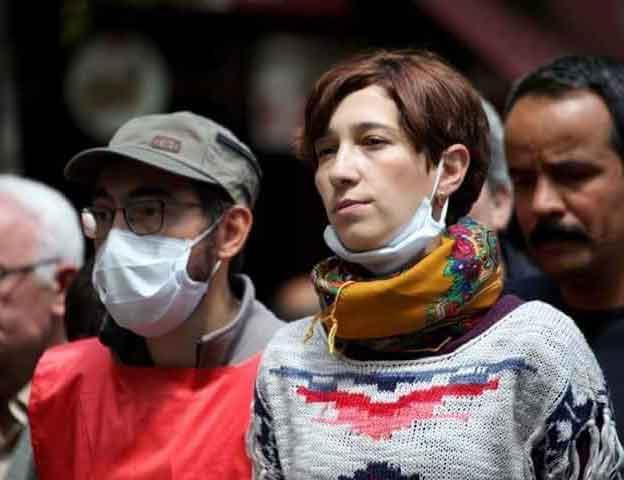‘Case is arbitrary, politically biased’: Hunger-striking teacher Özakça makes defense after months in jail
ANKARA

Imprisoned teacher Semih Özakça, who has been on hunger strike for over 200 days, gave his first defense statement at the second hearing of the case in which he and fellow hunger-striking academic Nuriye Gülmen, are being tried.
Özakça said their jailing during the trial is “arbitrary” and blasted the case as “politically biased.”
“My defense will not be in this political case, which is null and void. I was a teacher earning my bread with dignity and labor. The [ruling Justice and Development Party] AKP is trying to discipline me through my bread,” he said at the Sept. 28 hearing, which he attended for the first time after months in jail.
The Ankara 19th High Criminal Court is continuing the case on Özakça and Gülmen, in which they are accused of “being a member of an armed terrorist organization,” “violating the law on demonstrations and meetings,” and “making propaganda for a terrorist organization,” facing sentences of up to 20 years in jail.
In the prosecutor’s indictment, they are accused of carrying out their protests “on the instructions of the [outlawed Revolutionary People’s Liberation Party-Front] DHKP-C.”
Özakça and Gülmen were dismissed from their jobs with state of emergency decrees, and started their hunger strike on March 9, 2017, demanding to be returned to their jobs. They conducted a sit-in protest in Ankara’s central Kızılay neighborhood from Nov. 9, 2016 before going on hunger strike. They were then arrested on May 23, 2017 and have been continuing their hunger strike in jail.
“We were arrested because our hunger strike was reaching people. We were arrested because our imprisonment would feed fear and intimidation. We were arrested because we were an obstacle to the AKP’s policies,” Özakça said in his defense, adding that “we paid the price of resisting and opposing.”
“If the authorities gave us our job back, we would not be going hungry. The authorities are the ones who initiated and tried to suppress the resistance,” he said.
“I will continue my hunger strike until I take my job back. We are not conducting a hunger strike to make a revolution or to overthrow the AKP, we just want our jobs back. That’s why we are on hunger strike. Work. That’s all,” he added.
Gülmen at hospital
Gülmen, who was taken to the Ankara Numune Hospital on Sept. 25, was not taken to the trial for the hearing, with the court board citing the hospital report indicating that her condition was not suitable to attend.
Main opposition Republican People’s Party (CHP) deputy Şenal Saruhan had said on Sept. 25 that the hospital had indicated that Gülmen’s “water intake has diminished and she is having trouble with sleeping and smelling. But she is conscious and lucid despite the serious deterioration of her health.”
Gülmen and Özakça had been held at Sincan Prison Hospital, where they were taken on July 31.
In his defense, Özakça said the authorities took Gülmen to the hospital in order to prevent her from attending the hearing.
“They took Nuriye to [the hospital] in order to avoid bringing her to the hearing. But forced intervention is a crime against humanity,” he added.
“We are not sick, we are protesters. I have just saw the sunlight for the first time since I was brought to the hospital. We are facing forced intervention threats there. We do not want an intervention,” Özakça said.
Objection to three lawyers rule
Sixteen lawyers representing Özakça and Gülmen were detained on Sept. 12, two days before the first hearing on Sept. 14, and 14 were subsequently arrested on terror charges, with Özakça blasting this “attack on our right to defence.”
“Our lawyers were arrested two days before our first hearing on Sept. 14. We were not brought to that hearing with an arbitrary ruling. We are on hunger strike and we have been tortured for 14 days [since the first hearing] in solitary confinement,” he said.
He also objected to the court board’s demand for him to choose three lawyers from among the hundreds of lawyers that have been given authorization.
“This implementation is an imposition. I do not accept it,” he said.
With a state of emergency decree issued after July 15, 2016, coup attempt, the maximum number of lawyers that can defend suspects in terror-related cases was limited to three.
















